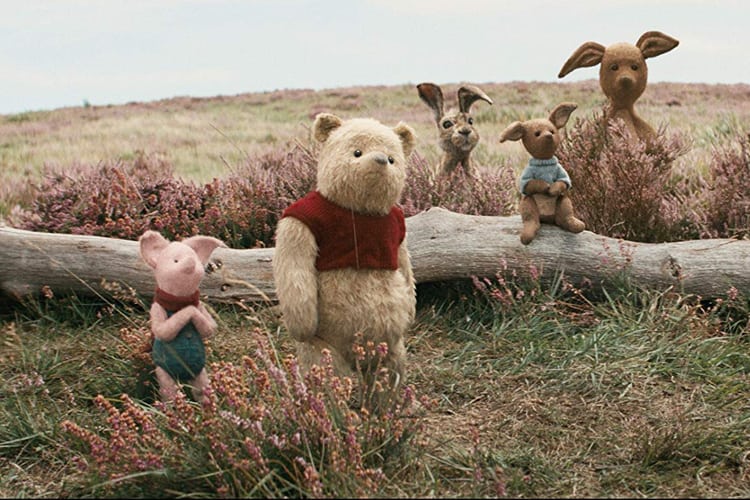To distract the world from their secret plan to buy out every other movie studio, Disney has been remaking their animated classics. Most of them have been beat-for-beat live-action remakes, but “Christopher Robin” is more of a sequel to a book that a classic Disney property is based on.
That classic Disney property, of course, is Winnie the Pooh. Do you hear the millennials and baby boomers rejoicing together? Can you taste the honey, almost as sweet as the nostalgia? A visit to Hundred Acre Wood was long overdue, and “Christopher Robin” wastes no time in getting there. The movie opens on Pooh, Tigger, and all their friends having a goodbye dinner for Christopher Robin before he heads off to boarding school. These classic characters have been brought to life with remarkable care: the animation is resplendent in its detail; stitching together the familiar faces with love and attention.
The voice cast sounds just like you’d want them to. Many of them voiced their characters in past animations, while others are new but capture the old personalities perfectly. It does feel like a missed opportunity to meet them all in the movie’s opening, though—the second act brings the animals together one by one, which would be a far better nostalgia trip if they hadn’t already appeared at the start.
“Christopher Robin”, however, is about grown-up Christopher Robin (Ewan McGregor, showing up for a paycheck). Lest you think that he aged gracefully after his magical upbringing, the movie goes to great lengths to convey how lost his luster is: he works at a corporate office for a company that makes luggage. His wife hasn’t seen him smile in years. He reads his daughter textbooks when she goes to bed. At one point, his daughter asks how to have fun, presumably because she’s never had it under Christopher’s watch. He’s so senselessly stuffy that it’s a surprise he doesn’t throw Pooh in front of a train.
This Christopher is the inverse of simplistic kids’ characters that have dominated movies for decades. Where some films have insulted young people by overlooking their serious struggles, “Christopher Robin” insults adults by making its central character a bundle of clichés. One cannot say anything insightful about adulthood if they oversimplify its effect on a person.
But unfortunately, “Christopher Robin” is in the business of oversimplification. It utterly fails to say anything interesting about Christopher’s return to his roots. If you’re an adult and you don’t act exactly like your childhood self, you’ve gone wrong somewhere, Pooh and company suggest. They challenge Christopher’s assertion that there’s more to life than balloons and honey—but there is more to life than balloons and honey. There’s more to adult life than the pursuit of innocent pleasures. Navigating the complex mazes of adulthood requires more than a one-thought-fixes-all Disney affirmation.
Elsewhere in Disney’s many properties, Pixar’s “Inside Out” sees the profound truth about growing up that “Christopher Robin” erases. “Christopher Robin” tells us not to lose any part of ourselves as we age; “Inside Out” recognizes that growing up means we have to let go of things we once treasured. Winnie the Pooh is Christopher’s immortal Bing Bong, refusing to fade away, refusing to acknowledge the hardest parts of getting older. There are moments that Eeyore seems like he acknowledges the role of sadness in adult life, but the movie drowns him out as it trades sadness for ignorant bliss.
Given that “Christopher Robin” is the live-action adaption of a fictional bear, it cannot escape comparisons to “Paddington”. The British bear entered the modern age by tackling issues such as accepting refugees, prison reform, and (somewhat presciently) reuniting immigrant families. “Christopher Robin” is set in 1949 and makes clear that women, among other minorities, aren’t valued in Christopher’s workplace—but the movie drops that issue immediately, preferring instead to let Pooh bear mutter platitudes like “doing nothing often leads to the very best something”.
At least it’s honest about its level of effort. “Christopher Robin” is a beloved icon shoved through a thoughtless formula, full of honey and signifying nothing.
★½ (1.5/5)




